Allison M. Dickson's Blog, page 18
October 15, 2012
Musings on Blood and Water
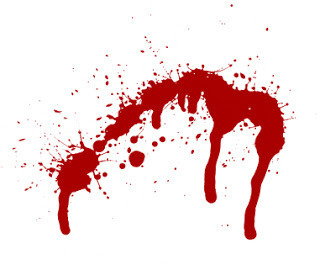
"Blood is thicker than water."
I hate this phrase. I hate it more than my friend and Creative Commoners co-host Chris Armstrong probably hates the phrase, "It is what it is."
It's meant to be one of those clever idioms where the literal truth is supposed to lend itself to a more poetic one, but poems are airy and shifty little things. They aren't one-size-fits-all, and in my particular case, the poetry just passes right through me, sticking to very little on its way out.
To me, the notion that the family you are born with is automatically better than the one you pick for yourself is fundamentally bullshit. It's the same notion that's related to unfailing patriotism, which I also find to be bullshit. Our culture puts so much emphasis on the virtues of free will that it astounds me how much we put products of simple fate up on a pedestal. You can't pick your family. You can't pick your country of origin. So WHY do these things command our unquestioned allegiance? Sometimes we're just lucky. We're lucky to have great families. We're lucky to live in great countries. That's it. Luck. We can be grateful for that luck, but that's not the same as being completely subservient to it. These expressions were created by people who have never truly suffered as a result of who they were or where they were born. Or they're adhered to by people who are too afraid to say otherwise, out of fear of punishment. Try saying them to a starving African refugee and see what kind of blank stare you get in return.
Without delving into things best saved for a tell-all memoir I will likely never write, I can say I've always felt very alienated from family outside my immediate circle. I've never had anything more than superficial (at best) relationships with my grandparents. They never really seemed all that interested in who I grew into as I got older, and they really weren't all that interested in me when I was a kid, either. My emotional connection to my bloodline thins the further out I go. Aunts, uncles, cousins? We might as well be strangers. Physical distance might have been to blame for some of this. We lived in different states for much of our lives, but there were so many other factors and conflicts at play that drove the wedge deeper. I think the biggest one is this: we just don't really like each other all that much.
Maybe they'll scoff outwardly at that, but it's true. We might be related, but that is all we have in common. Or all we care to know about one another. You'd think, if we did like each other, we'd strive to be in each other's lives more. That we'd want to learn more about one another. That we'd visit or write or talk on the phone more. But we don't. The only glue holding us together is a few strands of genetic code. We didn't ask to be born in the same family. We just were. And now the only thing we can do is just grin and bear it. At least until we decide not to and take control of our own lives and ask ourselves why the hell we're doing this. Why are we forcing ourselves to sit in a room with a bunch of people we don't really like, cook for them, give them Christmas presents, endure conversation that bores us in every possible way? ESPECIALLY if some of these people have caused us genuine pain and heartache. Why do we continue to play in this mismatched orchestra with its tuneless and jangling notes, when we could be hanging out with people who actually do bring something positive and harmonious to our lives? People who have a mutual desire to understand and love one another. People who don't go out of their way to make you suffer? Why does this faulty notion of "family above all" trump one in which we just spend time with people we don't despise?
Well, it shouldn't. When politicians speak of "family values" as this virtuous thing, I hope they weren't talking about my (non-immediate) family, because it would essentially mean a group people who simply endure the company of people they loathe, out of a sense of obligation and little more. A certain measure of cowardice. A desire to avoid conflict. That is probably not the best thing on which to model a happier society. I sincerely hope we all would aspire to more than that with our relationships in the short time we have on this planet. If you don't like your family, there are a few billion other people out there who might better provide what we're looking for. We should not hang onto toxic relationships under the false belief that "we can't give up on family."

Fuck yes we can give up on "family." In a lot of cases, we absolutely should. That it shares a portion of your DNA is not enough reason to keep it in your life if all it does is bring you down.
So yeah, blood and water. I'll tell you the real difference between the two:
Blood is harder to wash off. It stains and leaves a permanent reminder that it was there, even after you've wiped it away.
Water, on the other hand, is life. You can't have blood without it. If you have no water in your blood, you have little more than dull little flakes that are useless to anyone. The best thing you can do is scrape them off and move on in search of that grand oasis, of chosen family.
Published on October 15, 2012 08:38
October 11, 2012
The Horror Author Who Hasn't Written a Horror Book: Part II
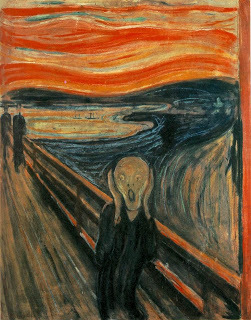
Awhile ago, I lamented over the fact that I consider myself a horror author, but that I had yet to actually write a horror book. You can read about that here.
In the blog, I pondered why I hadn't been able to take my horror writing to the next level, and here is a snippet:
Writing horror is difficult for me, particularly in an emotional sense. When I write my horror short stories, I breath a sigh of relief when they are done. It's like sticking a toe into a pool of piranha just long enough to avoid being shredded. Horror requires you to go to very dark places, and because the hallmark of the genre is that the ending is often left unresolved (or just plain dreadful in some cases), there is no sense of hope awaiting you or the characters you've been riding along with for the past few months.
Well, a few months ago, the right horror story finally came to me, one I could easily develop into a novel. And in the process of writing that novel, I've come to learn that what I most feared would happen when I went with a longer form in this genre is definitely happening. I would not say I'm depressed, but the inherent mood of this book is definitely transferring itself to me. Or, rather, I've been mining away at the darkest corners of my brain much longer than I'm accustomed to, and I'm starting to feel the effects.
When I'm not working, I want to sleep. And when I wake up in the morning, I don't feel like I've slept at all. I'm drinking a lot of coffee. I'm not eating as well (or as much) as I had been, and when I am hungry, all I want are fatty comfort foods. I'm feeling weepier than usual. Irritable. Withdrawn. Moody. Slightly anxious. Basically, my psyche feels like it's on the ropes.
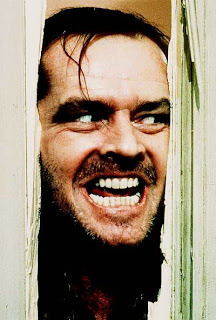
I don't know how horror authors do this on a regular basis without losing their minds. Then again, maybe it's something they've grown accustomed to over time. You become acclimated to those dark corners and it starts to feel more like a routine. A bit like how it must feel the first few days in high altitude before your body adjusts, or when you're first learning to play the guitar, and the strings are making your fingertips bleed until they form protective calluses. It certainly makes me understand, probably more than ever, why some authors turn to drinking and drugs to quell the demons. It's like opening a wound over and over again, and that need to anesthetize is very strong. And when you feel that way, when you're looking through your life through decidedly blood-colored lenses, you start to feel like shit about every other thing in your life, and that DOES eventually breed depression.
Anyway, I'm making this sound like I'm killing myself with my work, and I want to stress that I have no interest in doing anything of the sort. I don't want anyone to worry about me or think I'm losing my shit or that I need some kind of intervention. I don't choose to treat negative emotions as taboo, or something from which I need to be "rescued." I'm allowing myself to feel these feelings and learn from them. It's teaching me things, like maybe I need to have more positive outlets in my life when I'm working on projects like this. I should be exercising more, keeping the endorphins rolling. I should be taking regular breaks to work on some lighter, more benign fare. My tendency to work obsessively when I'm "in the zone" may not be the right recipe for this type of work. Measured and controlled doses of exposure are probably the ticket.
But I can say this, and I am saying it without the slightest bit of ego. I feel like this is probably the best thing I have written to date. I truly believe that this book has forced me to push myself to a point that I have never been. I've lived in a loft above everything I've previously written, weaving things from a safe distance and running away if I feel like I'm getting too close. As a result, my work has had a quality of aloofness that I've always hated. Maybe not everybody notices it, but I do. I always have. There has always been this invisible barrier separating what I'm doing from what I WANT to do. Strangely, I don't feel like this barrier is there anymore. And maybe this brief stint in emotional purgatory is the price I'm paying for that.
I think I can live with that. I'll come out stronger, and hopefully better, on the other side. Look for a part three to this unintended series in the near future.
Published on October 11, 2012 08:44
October 10, 2012
Let's Talk About Length
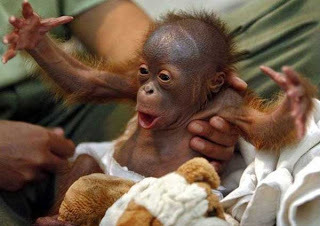
An accurate illustration of the length of Stephen King's The Stand
I mean book length, you pervs.
So, how long is your book? At what point do you start to have an idea for how many words something is going to be? Do you have a word count "goal" in mind for your books?
There is a long held school of thought that length doesn't matter. That the length of your story is the length of your story, and you shouldn't even think about it when you're writing.
Well, that's nice and all, and it does make sense from a purely artistic perspective, but people who say this likely haven't spent much time in the publishing world, where length in fact DOES matter, whether you're submitting short stories to magazines or novels to publishers. It doesn't matter as much in the indie/e-publishing world, but I'll get to that. In the traditional publishing world, depending on your genre, if your book doesn't reach a certain minimum, or if it exceeds a certain maximum, it will either be considered a novella (which a lot of traditional publishers won't publish), or it will result in a costly tree holocaust that might scare some publishers away.
I have learned over time that if you're writing books for kids, it's okay to have a short book. Between 50K and 70K is probably standard from what I've seen, especially for debut titles. There are exceptions, of course, but if your YA book is 53K, it's probably not as much a reason to panic than it might be if your YA book was supposed to be adult fantasy, sci-fi, or pretty much any other genre. In those cases, it's not a bad idea to shoot for somewhere between 75K and 95K (again, if you're a "new" author). Adults are, theoretically, supposed to have wider attention spans and the ability to read thicker books, and certain fans of certain genres demand them. There is a sweet spot a lot of publishers do like to see. Something that doesn't send their print costs soaring too high and that will be appealing to most mainstream readers. If it's super long, you usually need to have a proven track record before they'll print your ginormous doorstop.
For what it's worth, when it comes to novels, I do write with a word count goal in mind, taking into account the genre and the audience for said book. Having the goal also helps to ensure that I'm able to properly stretch my wings and let the story breathe. I'm a notorious under-writer, meaning I tend to cut corners on a first draft in order to get it done, and therefore my books tend to be a lot shorter than I originally intend, which forces me to go back and expand certain sections. Which is annoying and tedious and kind of sucks the joy out of the process. And probably makes the book not as good as it could have been.
I would love for STRINGS to be around 90K words. I want a hefty tome, but not so hefty it makes a publisher wince. I want it to be one of those books that someone in a store picks up, reads the description, and goes "Hell yeah. This'll be be one hell of a ride." Instead of, "Who's got time for this shit?" and putting it down. And then calling their doctor because they threw out their back in the process.
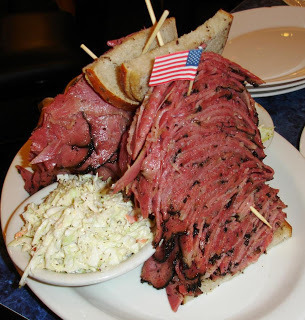
No one would be illiterate or hungry with books like this
No offense to anyone who writes books that long. I think, again, it comes down to audience. Fans of high fantasy and Tom Clancy would expect nothing less than something as thick as a New York deli pastrami on rye. And personally, I like longer books from my favorite authors. If there is a Stephen King book under 300 pages, I already feel a pang of sadness before I open the damn cover.
E-publishing has really relaxed these standards, though. That's because regardless of how long or short your story is, a Kindle still weighs the same. And no matter how long it is, you will still have readers who will complain that something is too short. Regardless, because you won't have to appease a business owner's optimal print cost/shipping/shelf stocking formula, the girth of your book really only needs to please you, and you can rest assured knowing that because your book is over 40,000 words, your 47K word book still qualifies as a novel in some circles (like the SFWA), and you can then market it as such.
But going back to the first argument about how length should be a non-factor in storytelling, there is some truth there. You don't want your obsession with an arbitrary number forcing you to pad the living shit out of your book, adding things that make it feel stuffed and stilted when it could very well be that you've written a novella and you should be happy with that. And you don't want to cut out the huge pieces of your epic that made it interesting, all because you don't want it to be "too long" for a publisher's consideration. If your book qualifies as a novel, and if after editing the hell out of it and getting input from other readers you truly believe it is just long enough, submit it and see what the publisher says. They've been known to make exceptions from time to time, especially for potential bestsellers.
Published on October 10, 2012 10:56
October 5, 2012
The Plight of a Shamed Writer, or How Little Women Ruined Me
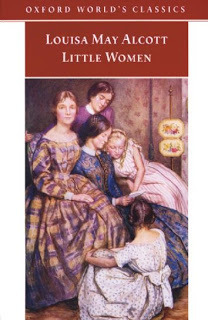
Making Allison Feel Inadequate Since Always
My name is Allison Dickson, I write genre fiction, and I am deeply ashamed of this.
Yes. Yes I am. Or, I was. Or I'm working on being less so. It's a process.
I am aware that this is a cognitive malfunction, and that I shouldn't feel this way. I know, intellectually, one should not feel shame for what one loves (unless we're talking about something abhorrent like pedophilia or Michael Bay movies, but I digress).
I've struggled with the notion of edification for most of my career, or the notion that I shouldn't be writing about supernatural events, ghosts and monsters, mystical things, far off worlds. Instead, I should be writing about "important" things, like human suffering and triumph as seen through the lens of gritty reality, with stark and daring prose that people spend more time interpreting than actually reading. I should be writing "from life." I should be like Jo March in Little Women, who was chided by the man she loved for writing horror stories and who eventually earned his respect after she wrote a beautiful sob story about her sisters.
In fact, I would say that it was because of that book, which I read at a very impressionable age and still love in many ways, that I started to view genre fiction as something I would eventually "grow out of" once I found my true voice as a writer. The weird little stories I took the most joy in writing were only supposed to be my authorial teething biscuits, and that once I was ready, I would move on to a prestigious career teeming with National Book Awards and Pulitzers. I would walk among the celebrated gods of literature.
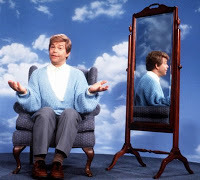
I'm good enough...I'm smart enough...
Well, that still hasn't happened, and it likely never will. The truth is, the more I write, the more I'm discovering that I'm not that kind of writer. I wasn't given the talent of a Thackeray or a Twain or a Marilynne Robinson or a David Foster Wallace. I will not be the next Melville or Austen or Joyce. Hell, I don't even possess the brilliance of Poe or Lovecraft, but like those latter fellows, I have an appreciation for the macabre and I feel like there might just be a place for me at their table--at the far end where they won't even know I'm there--and that's perfectly okay. I might not have their talent, but I do have my own talent. I write like me, and that's...okay.
Anyway, this is just a glimpse into my daily struggles as a writer. I'm sure painters might feel similarly, knowing that while they might excel best at painting pretty landscapes, they might never master the art of Cubism. I strive every day to be comfortable and proud of what I can do, the stories I can tell. Little by little, those voices telling me I'm wasting my talents on frivolous pulp are receding. More and more I am becoming okay with the fact that those in a position of literary authority will probably consider me a hack. But you know what? There is nothing wrong with setting out strictly to entertain. There is a book for everyone, and what one person won't like, someone else will love. Besides, I am not just writing fluff over here. A lot of thought goes into my work.
More and more, I'm finding it easier to wave my pulp flag proudly.
My name is Allison Dickson, and my goal is and should only be to entertain the shit out of you. Louisa May Alcott can bite me.
Published on October 05, 2012 14:49
October 2, 2012
NaNoWriMo. Twice in the Same Year. Back to Back. Because I'm Crazy.
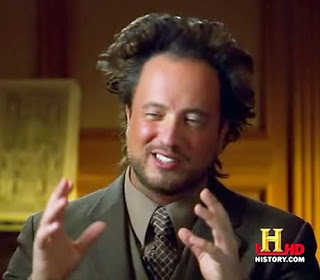
But maybe not this crazy...
I'm only a third of the way into a novel I hope to finish by the end of October. That statement both feels and sounds more daunting than it actually is, especially when I think about the things I've accomplished in previous years. After all, I wrote the entire 56K word first draft of The Stargazers in just under 3 weeks. It was short, sure, but it was a complete book that I eventually expanded (and you can buy it now, ahem).
In fact, for the last four years, I have written 50,000 words in the span of 12-20 days without breaking much of a sweat. 50,000 words is just easy for me. I'm not bragging. It's just the simple truth. My productivity might be better than some people's, but there are writers who can and do kick my ass on a regular basis in terms of output, and they also, you know, finish nearly every book they start. My average is improving, but it's still not quite where it should be.
But if 50K is the cakewalk, it's the 30K or so proceeding words that are the real challenge. STRINGS has over 30K words right now, so at least there is that. If I work as hard over the next two or three weeks as I have during every November since 2008, I will finish the first draft well before the end of the month, just in time to start the REAL NaNoWriMo. On paper, this is totally possible. I'm not exactly working outside the boundaries of my capabilities here. It just means I have to actually, you know, do the work.
Of course, this means that instead of one month where I'm getting absolutely no household chores done, there will be two. That's new. It will also mean two months where I won't be getting out much, where I'll be drinking far too much coffee (I only break out the brew when shit gets serious), living in my pajamas, sleeping too little, and paying very little to no attention to anything else that might be happening in the world. People and animals may or may not get fed around here. I may also wind up smelling bad and muttering to myself like a hobo. It happens.
But that's the madness of it all. I'm sure, by December, I won't be writing another word for about three months. Editing is the ultimate equalizer. So is coma.
Published on October 02, 2012 11:48
September 20, 2012
Television Wives: Tired of the Ophelias
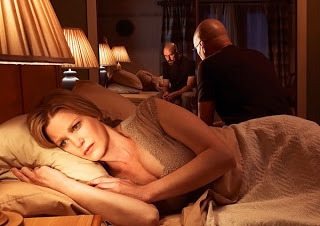
Writers, it's time to start thinking outside the box a little when it comes to writing female characters. Particularly wife characters. I'm really getting tired of seeing otherwise great stories being dragged down by the tired as fuck Lady Plot Blocker formula. No, scratch that. It's not merely a formula. It's a disease that has been infecting fiction since the beginning of fiction.
For whatever reason, when we (and I say "we" because I've been guilty of this myself on occasion) write stories, we usually have a man doing something either really bold or really dumb, but usually a combination of both. But that bold and dumb thing is also supposed to be the "heroic" thing, or at least the thing that drives the plot. He's the husband who has to dash off in the middle of the night to put out fires or invent the cure for cancer or be a superhero or cook meth, all while the wife sits at home doing all the "boring shit" like raising the kids and cooking dinner and essentially hating her life and giving her bold and dumb husband an ultimatum that states he must choose between his bold and dumb activity or her. Ultimately, of course, the man finds out a way where he can get both things and everybody's happy, fah-lah-lah-lah, but we the audience must suffer through a lot of needless artificial conflict building along the way.
I would say this is the case in nearly every movie and television show with a husband and wife dynamic. The wife or girlfriend can never actually support her partner. She has to be the roadblock. The naggy conscience. The Plot Blocker.
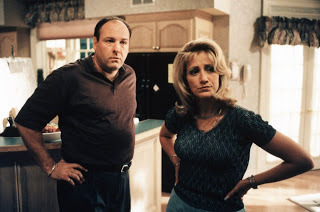
Sometimes there are hybrids, and we're seeing more of this. It's when the wife is married to an asshole, or at least to someone who is making her fundamentally unhappy, but perhaps this person is providing a comfort to her. Like a nice house and car and things he bought by say, working long hours or selling drugs or laundering money or killing people. Or, at the very least, by doing something morally uncool. But of course she STAYS with him, because she needs and/or wants those material things for herself and/or her kids. There is always a reason to stay because the plot will provide one. It's usually a really dumb and shallow one, something that also portrays the woman as dumb and shallow, but there is always a reason. And she's going to complain about everything the whole time. Eventually, she'll enter some spiral of misery during which she'll start screwing around behind the husband's back. Maybe she'll start up a really nifty drug habit. Maybe, in a last-ditch effort to remind the world of what a miserable and complaining harpy she is, she'll attempt a really elaborate suicide and fail in such a way that clues her husband into what a dolt he's being. Or maybe it'll be all of the above.
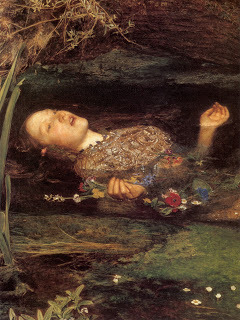
Because she has to be a victim. She can't act of her own accord, because she's now a hostage in a prison of her own making. She's a woman trapped in a man's world. She's a hopeless pawn of the Patriarchal Penis Overlord sharing her bed, and the only real way out for her is madness and/or death. A death that most of the audience will likely have been hoping for, because she's been written into such a pathetic and non-sympathetic human being by people who truly do NOT understand that just because she's a woman doesn't mean she has to act this way. And for whatever reason--because the plot simply wouldn't allow it--she can't just take the kids and run, get a restraining order, call the cops, or even perhaps become a witting and willing and enthusiastic partner in her husband's gritty enterprise. She can't actually take control of her life and make something better of the situation like an actual, thinking adult would, because no, SOMEONE has to watch out for the kids, right? Someone has to be the conscience for the bold and dumb man. A very naggy, histrionic, passive-aggressive, victimy conscience. And that someone will always have to be the gentler sex. The female. The wife.
That is why people generally can't stand television or movie wives. People will call us sexist for feeling this way, but no, I cast that aspersion on the so-called creative minds behind these works for enabling this flawed storytelling device to continue through every medium. Enough already.
Hey, writers. Can we try something new for a change?
Published on September 20, 2012 20:08
September 19, 2012
The Next Big Thing Blog Hop
Today over on the lovely and talented Gae Polisner's blog, she talks about her work in progress, In Sight of Stars as part of a little "blog hop" tour. Since anyone who read her entry was considered "tagged," I went ahead and tagged myself. Truth be told, I was looking for a bit of a diversion while I mulled over the next scene I have to write in my own work in progress, Strings. Appropriately, the questions below will allow me to go into a little more detail about that.
The Rules:
Answer these ten questions about your current WIP (Work In Progress) on your blog
Tag five other writers/bloggers and add their links so we can hop over and meet them.
Five might be a stretch, but here goes: Ian Healy, Becky Kyle, Megan Bostic, Bryan Hall, Armand Rosamilia
Ten Interview Questions for The Next Big Thing:
What is the working title of your book?
Strings.
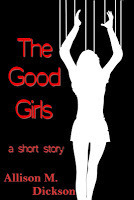
Where did the idea come from for the book?
Well, the book itself is a major expansion on my short story, The Good Girls, which is currently available for download. And the idea for that story originated with a simple but strange pondering on the nature of being reclusive, and what sort of darkness that can lead to. Then I wondered what it would be like for a prostitute to visit Howard Hughes in his latter years. Of course, I need to clarify that the hermit depicted in the story and subsequent book book has nothing in common with Hughes, other than he has a lot of money.
What genre does your book fall under?
Dark crime or mainstream thriller/suspense. I really have that narrowed down, don't I? Where do they put James Patterson's books? Oh shit, I can't believe I just said that.
Which actors would you choose to play your characters in a movie rendition?
Nina: I would like to have a relative unknown for this role. Someone in her early 20s, who has guts and a bit of edge to her.
Ramon: Javier Bardem
The Madam: Marisa Tomei (with flaming red hair)
What is the one-sentence synopsis of your book?
Three broken souls with entangled fates, all leading to the same dark place. (okay, that sucks, but I hate coming up with this stuff, and I'm not really in marketing/query mode yet)
Will your book be self-published or represented by an agency?
Because I believe this book has some real commercial potential, I would like to see it on the wider market if possible, so my intent is to find an agent to represent it. That is, if my current publisher, Hobbes End, isn't interested in taking it on.
How long did it take you to write the first draft of your manuscript?
I'm still writing the first draft. I'm about 30K words into it at the moment, and I estimate it's about a third of the way done. I hope to have the first draft finished later this fall.
What other books would you compare this story to within your genre?
That's tough. I don't like doing that too much, because I don't want to be caught actually comparing myself to other authors. But to give an idea for the type of book I'm attempting to write, it's essentially a Millennium trilogy (Dragon Tattoo, etc) meets Stephen King's Gerald's Game or Delores Claiborne kind of thing. Something very dark and gritty, that speaks more to the souls of the characters than anything external happening to them. Each of the characters exist in an "underworld" setting. They live apart from the rest of us, though I think there is a constant longing among all of them to become something more, something better, only to be yanked back into the gutters and trenches of society. As much as they like to think they're in control, they really aren't. Hence the title of Strings. That probably sounds like a lot of books, so I'll leave it up to you to decide.
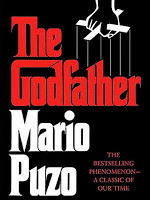
The similarities between this cover
and mine are a total coincidence, by the way
Who or What inspired you to write this book?
I recently watched The Godfather on the big screen at a local theater, right around the time I had finished The Good Girls and was still trying to find out if there was any meat left to this story. The movie, I think, gave me the mental boost I needed. The character of Michael Corleone was a big inspiration, because here is a guy who had aspirations to move beyond "the family" to become something better. Even Vito wanted that for his son, but it wasn't to be. The circumstances wouldn't allow it, but I think there was also something dark in Michael that wouldn't allow it either. Therefore, we essentially watch a three hour descent of a young and rather naive man into the clutches of the mob and who, by the end, has made it completely his own. That inspired me a lot. Also, I love stories like Unforgiven, where Clint Eastwood's character tried in vain to become a better man, but inevitably was roped back into the life that seems almost meant for him, whether he wants it or not.
Ultimately, we all think we're in control, but we're all being driven by something. We all have a price. Maybe that's a cynical world view, but I think that's what makes us human.
What else about your book might pique the reader’s interest?
The short story this work is based on is pretty grim and nihilistic, and that was my intent. I wanted, for a brief moment, to go to the darkest place imaginable. However, the book has a real soul. Its characters are all flawed and none of them are strictly "good," but then again, who is? My main intent here is to inspire people to have more than one specific feeling about a character. Like people, they are collages and mishmashes of deeds and experiences. They inspire a whole rainbow of emotions in us. Happy and sad. Sympathy and contempt. You want these characters to succeed on some level, but then again you don't. Those conflicting feelings create a very unsettling feeling in a reader. It makes them turn the story around in their minds long after they've finished it. It makes them question their sympathies and views. I love when a story does that to me, and I really want to exploit that.
Now Hop away to some really great writers
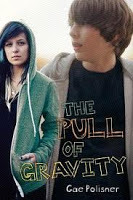
Check out all of the authors I have linked above. They're as varied as snowflakes, but all very talented. As for the one who inspired me to write this, you really should check out Gae Polisner's amazing book, The Pull of Gravity and keep watching out for her new work (I hear tell there will be a new book out soon, and I plan to buy it oh yes I do). This kid's going places.
The Rules:
Answer these ten questions about your current WIP (Work In Progress) on your blog
Tag five other writers/bloggers and add their links so we can hop over and meet them.
Five might be a stretch, but here goes: Ian Healy, Becky Kyle, Megan Bostic, Bryan Hall, Armand Rosamilia
Ten Interview Questions for The Next Big Thing:
What is the working title of your book?
Strings.

Where did the idea come from for the book?
Well, the book itself is a major expansion on my short story, The Good Girls, which is currently available for download. And the idea for that story originated with a simple but strange pondering on the nature of being reclusive, and what sort of darkness that can lead to. Then I wondered what it would be like for a prostitute to visit Howard Hughes in his latter years. Of course, I need to clarify that the hermit depicted in the story and subsequent book book has nothing in common with Hughes, other than he has a lot of money.
What genre does your book fall under?
Dark crime or mainstream thriller/suspense. I really have that narrowed down, don't I? Where do they put James Patterson's books? Oh shit, I can't believe I just said that.
Which actors would you choose to play your characters in a movie rendition?
Nina: I would like to have a relative unknown for this role. Someone in her early 20s, who has guts and a bit of edge to her.
Ramon: Javier Bardem
The Madam: Marisa Tomei (with flaming red hair)
What is the one-sentence synopsis of your book?
Three broken souls with entangled fates, all leading to the same dark place. (okay, that sucks, but I hate coming up with this stuff, and I'm not really in marketing/query mode yet)
Will your book be self-published or represented by an agency?
Because I believe this book has some real commercial potential, I would like to see it on the wider market if possible, so my intent is to find an agent to represent it. That is, if my current publisher, Hobbes End, isn't interested in taking it on.
How long did it take you to write the first draft of your manuscript?
I'm still writing the first draft. I'm about 30K words into it at the moment, and I estimate it's about a third of the way done. I hope to have the first draft finished later this fall.
What other books would you compare this story to within your genre?
That's tough. I don't like doing that too much, because I don't want to be caught actually comparing myself to other authors. But to give an idea for the type of book I'm attempting to write, it's essentially a Millennium trilogy (Dragon Tattoo, etc) meets Stephen King's Gerald's Game or Delores Claiborne kind of thing. Something very dark and gritty, that speaks more to the souls of the characters than anything external happening to them. Each of the characters exist in an "underworld" setting. They live apart from the rest of us, though I think there is a constant longing among all of them to become something more, something better, only to be yanked back into the gutters and trenches of society. As much as they like to think they're in control, they really aren't. Hence the title of Strings. That probably sounds like a lot of books, so I'll leave it up to you to decide.

The similarities between this cover
and mine are a total coincidence, by the way
Who or What inspired you to write this book?
I recently watched The Godfather on the big screen at a local theater, right around the time I had finished The Good Girls and was still trying to find out if there was any meat left to this story. The movie, I think, gave me the mental boost I needed. The character of Michael Corleone was a big inspiration, because here is a guy who had aspirations to move beyond "the family" to become something better. Even Vito wanted that for his son, but it wasn't to be. The circumstances wouldn't allow it, but I think there was also something dark in Michael that wouldn't allow it either. Therefore, we essentially watch a three hour descent of a young and rather naive man into the clutches of the mob and who, by the end, has made it completely his own. That inspired me a lot. Also, I love stories like Unforgiven, where Clint Eastwood's character tried in vain to become a better man, but inevitably was roped back into the life that seems almost meant for him, whether he wants it or not.
Ultimately, we all think we're in control, but we're all being driven by something. We all have a price. Maybe that's a cynical world view, but I think that's what makes us human.
What else about your book might pique the reader’s interest?
The short story this work is based on is pretty grim and nihilistic, and that was my intent. I wanted, for a brief moment, to go to the darkest place imaginable. However, the book has a real soul. Its characters are all flawed and none of them are strictly "good," but then again, who is? My main intent here is to inspire people to have more than one specific feeling about a character. Like people, they are collages and mishmashes of deeds and experiences. They inspire a whole rainbow of emotions in us. Happy and sad. Sympathy and contempt. You want these characters to succeed on some level, but then again you don't. Those conflicting feelings create a very unsettling feeling in a reader. It makes them turn the story around in their minds long after they've finished it. It makes them question their sympathies and views. I love when a story does that to me, and I really want to exploit that.
Now Hop away to some really great writers

Check out all of the authors I have linked above. They're as varied as snowflakes, but all very talented. As for the one who inspired me to write this, you really should check out Gae Polisner's amazing book, The Pull of Gravity and keep watching out for her new work (I hear tell there will be a new book out soon, and I plan to buy it oh yes I do). This kid's going places.
Published on September 19, 2012 09:55
September 12, 2012
God As an Artist
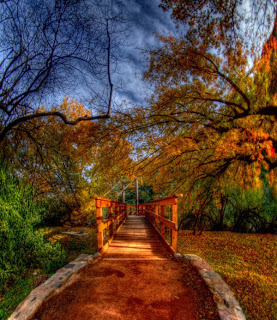
People like to assume that because I don't subscribe to the Christian faith (or any faith for that matter), that it also means I don't believe in God. And that if I don't believe in God (or at least their brand of it) then I must also believe there is no higher power. Many assume that I am an atheist or a nihilist. Some might even go so far as to say that I don't have any ethics or morals, because my beliefs aren't grounded in the tenets of some ancient scripture or stone tablet. Some people have told me that I frighten them. Maybe they think I have a disease that's contagious or that I eat fetuses for breakfast. At any rate, I'm more amused by such things than I used to be. It used to hurt, but then I realized that while I couldn't control their words, I could control how they made me feel. It's one of those either laugh or go crazy kind of things, and I'd much rather laugh.
The same people who believe these things, of course, will vehemently defend themselves against religious stereotypes people have made about them. They will be galled that anyone might think of them as ignorant or delusional, and perhaps bigoted, hateful, or narrow-minded. All of these things speak, I guess, to basic human nature. It's an innate characteristic that forces us to put groups of people into easily sorted categories. It's a time-saving thing. It's hard work to evaluate folks on an individual basis. I know a lot of Christians and consider them friends, and I think it's very unfair to brand all of them with the same iron. That is not to say that I haven't done so from time to time, mostly out of frustration and a desire to make them pay for all the times other Christians made me feel freakish or wrong for being the way I am. Other times, I just want to highlight the grave injustices that have been done (or are currently being done) in the name of religion in the hope that we could expand our horizons as a species, but that turns out to be only so much mental masturbation as well. But stereotyping is a dangerous game to play at. Unchecked, it can lead to some very nasty things, like hate groups, segregation laws, and genocide. It also breeds resentment and anger, and that's never fun.
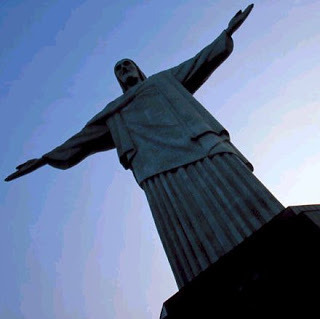
I went to church a lot as a kid. I know most of the scriptures. I had a big book of Bible stories that I loved reading. In fact, I still like a lot of those old parables, like the one about the Lost Coin or the Good Samaritan. I still can recite the name of every book between Genesis and the Revelation without tripping over my tongue (because doing so earned me a lot of candy in Sunday school). I also like a lot of the imagery and art that has come out of spiritual faiths. Obviously these beliefs have moved some people to create some iconic works.
But there was always the doubt. The questions were always there, and no one I asked in church gave me answers that satisfied me. When I was seven or so, I asked my dad why there weren't any dinosaurs in the Bible. I asked him a bunch of other questions too, but my dad, who is also not a religious type, just said that some people have this thing called "faith." They believe something, even if it might not be true or provable. And even then at such a young age, I found a flaw in this reasoning. I demanded logic. It's a trait I see in my own kids, and I could swear that I never implanted it. It's just an inborn skepticism, an ability to ferret out fact from fantasy that I hope they retain, regardless of whether or not they turn to religion.
The truth is, my spirituality is a very long and winding path that will stretch on for the duration of my life. I've passed by a lot of different ideas and notions, taking pieces of them as souvenirs before moving on, and I'm confident that I will continue to make new discoveries the older I get. I do know that I don't much appreciate the idea of an omniscient being who jealously demands my attention and allegiance. I don't much care for a god who would stand idly by as innocents die every day from hunger and earthquakes and floods and disease while some athlete proudly proclaims that this same being helped his team win the game. To me, that's just vulgar.
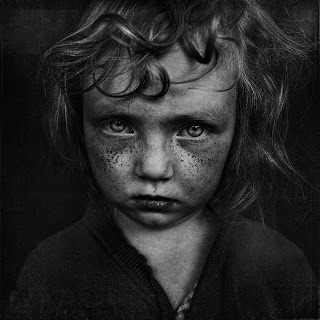
In the last week, I've received news of two small children I know of (ages 3 and 6) who died of cancer. In a world with an all-knowing, all-seeing, all-powerful God, that shouldn't have happened. In a world where such a God exists, a person like me should never have have been born, especially if the only available destination for me after I die would be hell (unless I repented, of course). Both scenarios assume that we humans are nothing more than markers on the board in a celestial asshole's game of Life, or better yet that aberrations like me were created to test the evangelical skills of "His" flock. You can throw all the "Free will/God works in mysterious ways/God's plan" stuff at me that you want, but it will do little to shake my my conviction that this particular deity--the one who lives on in so many forms in so many cultures on this planet--has the moral compass of a narcissistic sociopath. I choose not to believe such a being exists. To me, that would be the truly unthinkable horror, far worse than the idea that we are really alone in this universe, nothing more than an atomic accident.
It's the ultimate egotistical folly to assume that humans are the best this universe has to offer. Obviously we are not. I don't think we humans have yet gained the capability to conceptualize what put us, and the vastness that surrounds us, here. I think the ideas we've had so far are too small. They demonstrate the current limits of our species. Not only that, I think it's arrogant to go with absolutes over doubt. Doubt leaves me so much room for wonderment. It keeps me curious. It keeps me walking that spiritual path. It makes me hopeful that whatever is out there is so much better than the patriarchal overbearing sky lords that we've dreamed up here. If I have to choose between forcing myself to swallow these fables as truths, or putting my chips on doubt at the risk of eternal damnation, I will always choose doubt.
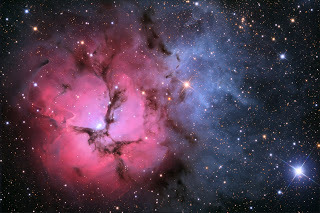
Despite what we see on TV, we're still evolving, and eventually we will come to a place of understanding about our real origins that will (hopefully) content us all. I was born too early to witness such a miracle, but I wish it for those who come after me. In the meantime, I hope they will live to treat people as they'd like to be treated, and to be comfortable in their capacity for mistakes and failure, to be human without the fear of burning for all eternity when they die, because to do otherwise would make for a pretty miserable existence. At least it did in my brief experience with it.
I choose to believe in something more positive and beautiful. I would rather see God as a flighty but brilliant artist gallivanting through the universe with a really big paintbrush, too damn busy to know or even care what we're doing here on this spinning rock. To this being, we're just one of many experiments in form and color, added to an infinite gallery stretching on for trillions and trillions of miles in every direction.
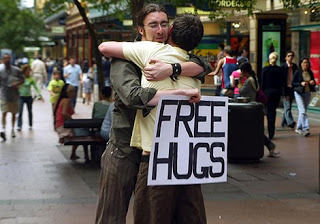
I don't know where this artist is right now or what its motives are, but what I'm sure of is that it left behind a bit of its artistry in each of us, and if we choose to acknowledge it, we can do some pretty astounding things. We can construct amazing buildings and bridges, and make each other laugh. We can rescue people from burning buildings and natural disasters. We can cure diseases, or hold the hands of the suffering so they know they're never alone. We can paint the most beautiful pictures and compose melodies and stories and movies so beautiful that they that make us tremble and cry. We can dance. We can teach and inspire children so that they might grow to one day inspire others. We can rescue animals from the brink of extinction and guard our planet from the destruction of pollution and war. We can care for each other, not because it's politically beneficial to do so, but because it's just the right thing to do. We can take ourselves to the Moon and beyond with machines that span the cosmos, and we can push back against forces of negativity and greed and evil and destruction, because all those good things and more are so much more powerful than the bad.
Those who can do any of those things are the ones who truly understand what it means to believe in "God," with or without religion, with or without a deity or a scripture, because they know that all it boils down to is getting through life without being an insufferable asshole. And in the end, I think that's good enough.
Published on September 12, 2012 08:16
September 5, 2012
F*CK Mommy Porn
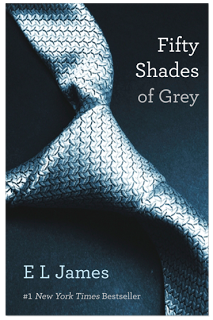
I am a mom.
I like porn.
Okay, that's not exactly true. I really don't watch a lot of porn, but I CAN say that I love sex and things that are sexy. And I am okay with porn as a commodity for human consumption, like beer or Doritos. It's just that, for me, watching porn is kind of like watching someone else play a video game I really want to play. It's frustrating and reminds me of what I'm not doing. If sex is unavailable to me for whatever reason, I'd rather just masturbate to a mind movie of my own creation and go to sleep. But that's beside the point. My point is, I swear to happy unicorn Jesus that if someone ever uses the phrase "mommy porn" in front of me without the least bit of irony, I'm going to judo kick him or her in the left buttock/testicle/tit--whatever's closest to my foot.
If you haven't heard the phrase "mommy porn" yet, you haven't been paying attention. It's become the mainstream way to categorize erotic romance stories with a strong female base, ever since the crazy huge success of the Fifty Shades of Grey books. But what does the "mommy porn" phrase even mean? Okay, that's rhetorical. We know what "mommy porn" means. It means "porn for moms." But what makes porn for moms different from actual porn? Is there porn for dads? (I suppose that just falls under the heading of "everything else.")
I guess, to those who coined the term and keep using it (and who are probably the same assholes who coined "mommy blogger" and "mommy job" and "mommy jeans" and "mommy cocktails"), mommy porn is either mild porn, porn without guts or ambition, or porn with a plot. Or maybe it's porn with a little bit of that steamy "I can fix a broken man" theme all us ladies can relate to. Or it could be porn made specifically for super tired women who have had an infant latched to each breast all day, and who just want to escape to a place where they can be spanked and tied up by a super rich dude and not smell like spit-up milk and baby wipes. It signifies the ultimate in wish fulfillment and escapism from the doldrums of "mommyhood," but with the caveat that it can't offend "too much." It's not enough that Christian Grey wants to subject innocent little Ana to the brutally exhilarating whims of BDSM. He also has to have mommy issues of his own that only Ana can alleviate.
But I think there is a deeper meaning here. Something that strikes at the heart of the whole societal perception of women in general, and I'm going to just lay it all out.
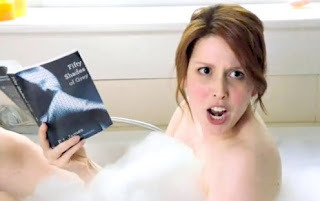
"Mommy Porn" depicts a woman who is so sexually uptight and repressed that she couldn't cut a silent fart without feeling shame for a week, and never mind actually having an orgasm. It depicts women who don't really "like" sex for themselves, but would rather experience it through a literary character or some soft core late night HBO skin flick. It depicts women who would never give a blowjob or would never have intercourse in any other style than missionary. It depicts an arid, joyless vagina that looks forward to visiting a penis (or penis-like implement) about as much as I anticipate cleaning out the cat's litterbox every day. It depicts women who can't even say the word penis without crossing their legs. And any ideas of whips, handcuffs, or even a little bit of dirty talk between thrusts must be relegated to the annals of smutty literature, to be read in secret and then rubbed out to a perfunctory near-orgasmic tingle (with a muffled squeak into a pillow, lest we wake the baby) between soaps.
Sure, women like this exist. My grandmother would have probably fainted after the first paragraph of this blog (and if she read the last paragraph, she'd probably have a coronary), but I think this whole depiction of "Mommydom" is just such... shit.
At its core, this "mommy" stuff is insulting and misogynistic, not only to moms, but to women. To say "mommy porn" implies that mothers are "delicate" and "frail" and "completely unoffensive." A "mommy" has to cut the crusts off our sandwiches while wearing jeans up to her rib cage. She must douche regularly with gardenia-scented Summer's Eve and do exactly as her husband tells her. And she must never, ever reveal a hint of her sexuality.
Isn't this shit a little outdated by now? How about we drop it once and for all and stop perpetuating sexually sterile stereotypes about women by associating the act of motherhood with things that are lame? After all, in order to become mothers, most of us had to get laid first, and I would bet the hypothetical farm that the overwhelming majority of us probably enjoyed ourselves.
Published on September 05, 2012 14:31
September 4, 2012
My Name is Allison M. Dickson, I'm Self-Published, and My Reviews Are Real

Chewing on rebar angry
I'm getting sick of this shit.
There is a new bone in the publishing sphere, and the insiders and consumers are slobbering over it like starving rottweilers. In the most unsurprising news ever, it turns out several self-published authors have gone into the business of buying their own rave reviews in order to artificially pump up their sales. Many mainstream buyers might not have thought this was happening, so it's kind of taken the world by storm, but anyone who has been in the industry for any length of time knows this is something that has been around for about as long as the internet, and the practice of artificially inflating the popularity of public figures (see: Payola for one such example) has been around about as long as, well, people.
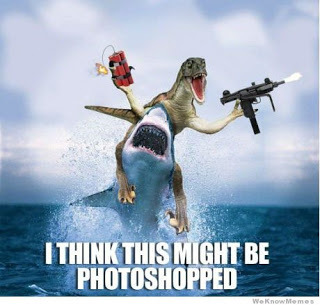
As genuine as some of John Locke's reviews?
It doesn't just happen in self-published books. It happens in traditionally published books. It happens in movies (see: "David Manning" of Sony fame). It also happens with local businesses through portals like Google Reviews or Yelp. It just happens, period. Fake reviews are as much a part of the internet's lifeblood as porn and photoshopped pictures of raptors riding on great white sharks. I wouldn't doubt for a second that some of said businesses have paid people to write negative reviews about the competition. And why not? Reviews are very easy and quick to write, and very few sites vet them for authenticity.
So none of this should come as a shock to anyone. But let's bring this back to publishing. I've said a lot about self-publishing on this blog, but there is one thing I haven't said, and it's something I've known for a long time. There is an undeniable stench of "hoping for the failure of others" wafting from certain circles of the traditional publishing community. They don't like seeing anyone making their own success, and so when these things happen, certain people lick their chops and proclaim, "I told you so! They're hacks and frauds and nobodies and this proves it!"
Maybe people think I'm building a strawman about as ugly as mixed plaids on a mangy ape, but trust me, the sentiment is palpable. Especially if you are on Twitter. A lot of it is said in good humor, and a lot of it is directed at the more sycophantic and hard-lined thinkers in the indie publishing biz (like the ones who use the word "legacy" to describe traditional publishing--they should be punched), but it's no less annoying hearing these things as someone who has worked my ass off for over two years to get where I am. And trust me, I'm not anywhere CLOSE to where I'd like to be. I think it's this elitist mentality exhibited by some circles of the industry that drives a lot of self-publishing upstarts to seek legitimacy through fake means. They just want to be accepted by their peers. They also want to be recognized and sell books. Not saying it's the right thing to do, but it still serves as a motivator for some.
That being said, I earned the shit out of my reviews. Every last one of them, from the 5-star love gushes to the 1-star spite fests. I get excited seeing them pop up. Every one of them is unexpected and thrilling, and came completely free of charge or without any of my prior knowledge. I'm grateful for every single person who took the extra minute or two out of their day to say something about something I've written. Those reviews helped me to feel like a genuine writer, and confident enough to call it career. They are part of the reason I'm still doing this, because I know people are reading and they are responding. I'm writing for my supporters and I'm still hoping to win over some of the haters.
I couldn't afford to buy reviews, even if I was ethically disabled, but more importantly, it's just wrong. I don't hire sockpuppets or create my own for the same reason I don't shoplift or steal money from tip jars or snort cocaine to lose weight or cheat on tests. I don't do these things because I'm not a shallow asshole, and I absolutely loathe the idea of cheating. I've danced at the threshold of ethical gray areas from time to time in my life (who hasn't?), but crossing over would just suck the joy out of life and my greatest passion. And I can guarantee that all of the people I know in this industry who are in the same boat as I am would say the same thing. We're just working over here. The only illusions you'll find from me are within the pages of my stories.
Really, this whole thing just fucking hurts. It hurts that the sockpuppets are ruining it for the rest of us trying to make an honest living. It hurts that those of us who have a story to tell, but who have not been given the recognition that others have enjoyed, are being marginalized and made into something "lesser" because we haven't been anointed by the oils of convention. It hurts that people are probably assuming that all of my five-star reviews are fake. If they are fake, let me tell you that no one would be as surprised and crushed as I.
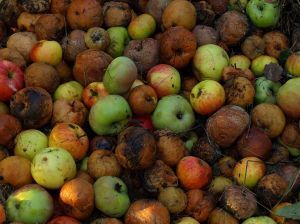
Some rotten apples. Outnumbered by good apples.
I've written a number of reviews for people I've never met in my life nor would ever expect to. If I can't put my name behind something, I don't review it. I do it because I want to be helpful, and because I like sharing my views with the world (as you might have guessed). A lot of people who write reviews want to do the same thing, whether they're being positive or negative. Reviews are a very democratic thing, and I think most people gravitate toward such a way of doing things. They want to believe that if the companies don't have our backs, that fellow consumers do. And I think for the most part, this system works. It isn't very often that I've bought something on the recommendation of a large consensus and wound up being thoroughly disappointed. Even though there might be a few rotten apples in the bunch, I think (like reports of voter fraud) incidents of fakery are far fewer than our cynicism leads us to believe. I think it's because average everyday people are still pretty damn honest, or they're too ambivalent to participate in elaborate theater over a fucking book.
Let's not let the few assholes in the group spoil the fun for everyone else, reviewers, readers, and writers alike. My reviews are very real, and you're welcome to join the very real consensus or go against it. Either way, I am always very grateful for your time.
Published on September 04, 2012 13:49



